Top 10 Effective Stress Management Techniques At Work
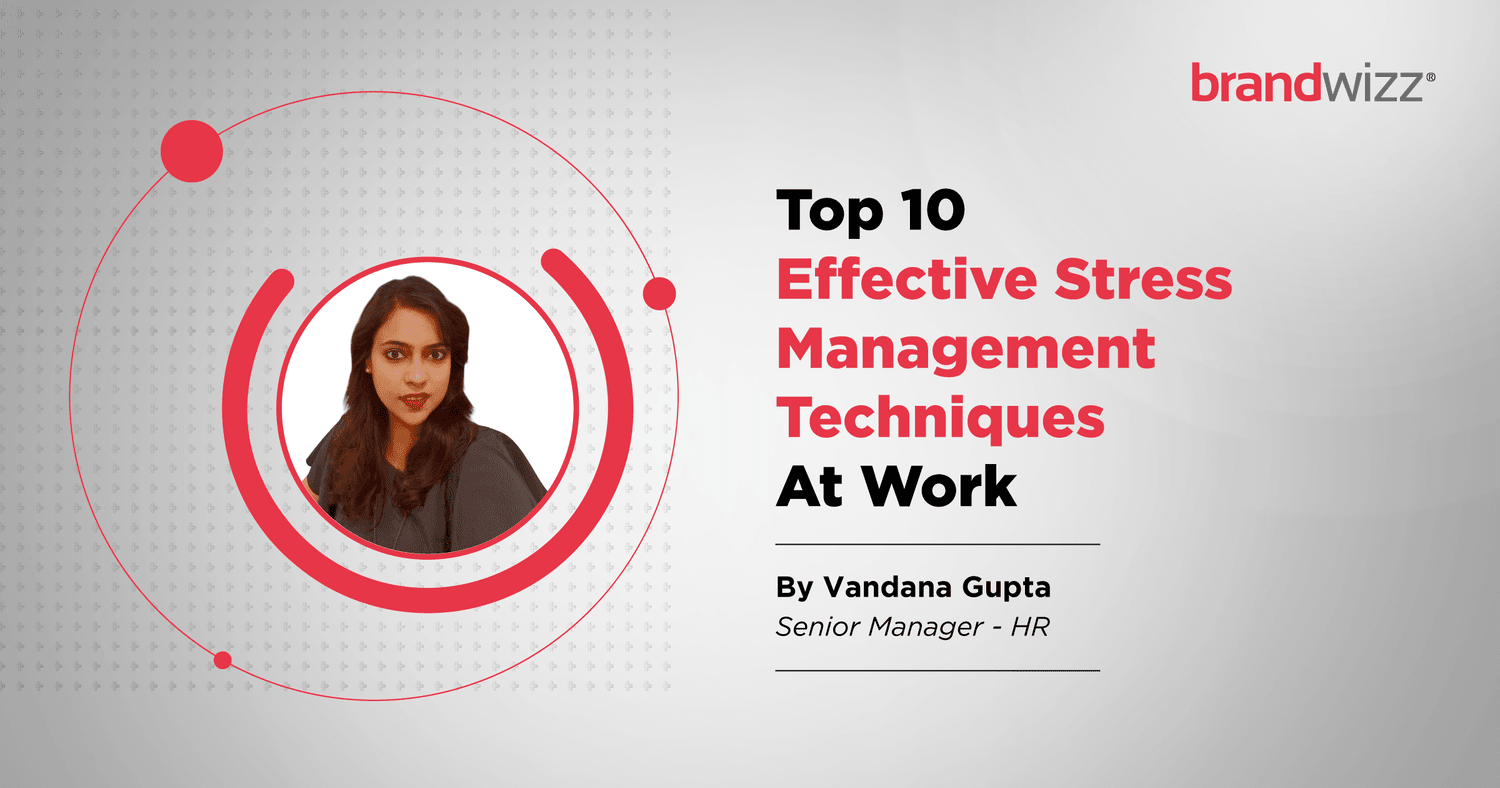
“Stress should be a powerful driving force, not an obstacle.” ―Bill Phillips
This positive outlook is, unfortunately, not shared by most modern-day corporate employees. A recent report showed that, for 1 out of every 4 people, workplace stress is the top point of concern in their daily lives. Excess stress, in turn, leads to a myriad of problems – right from low engagement levels and poor productivity, to communication breakdowns, deteriorating interpersonal skills, and even high employee turnover rates. In fact, work-stress causes nearly 16% of employees to look for new jobs. In a nutshell, too much stress affects individuals AND has significant knock-on effects on organisational performance & well-being.
However, all of these problems can be, if not entirely eliminated, at least minimised with effective stress management techniques. We will here focus on some of these useful strategies to tackle stress:
Maintain Boundaries; Do Not Overburden Yourself
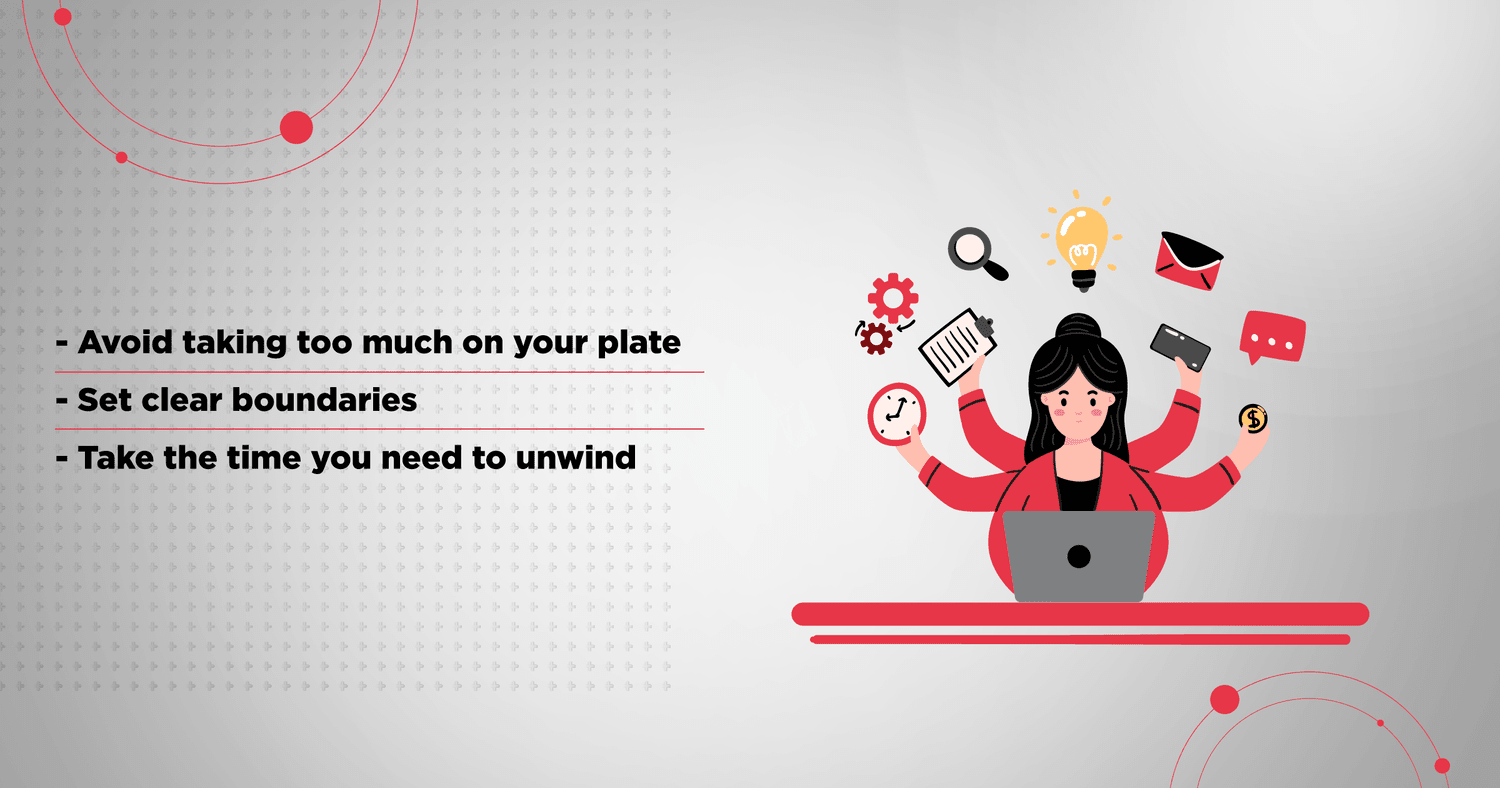
In the rush of modern-day corporate life, it is easy to make the folly of thinking that the world revolves around you. The more you believe in this (and try to become available 24×7), the greater will be your stress levels. Avoid taking on too much on your plate, and set clear boundaries regarding the time you need to unwind and detach yourself from work-related going-ons. For instance, do not stay glued to your work email all the time, and establish a ground rule of not taking calls after a certain time at night (unless, of course, there’s a work emergency). Maintaining these boundaries will minimise conflicts between personal and professional lives and the associated stress.
Avoid Setting Unrealistic Expectations; Do Not Let Others Do That Either
Project A is exciting. Project B is something you are a master of. Project C presents a new opportunity.
All of these are ‘good projects’ per se – but that does not mean you need to take up all of them simultaneously. Be very clear about your capabilities and your self-expectations (along with what others expect from you). In case you have doubts about your job roles and / or whether you are ‘doing enough’, take this up with your supervisor / management. Plan well, plan in advance, and – even if you are feeling super-energetic – never try to meet impractical expectations. You, and those around you, should know & respect your maximum capabilities.
Your Energy Is Not An Unlimited Resource; Manage It Smartly
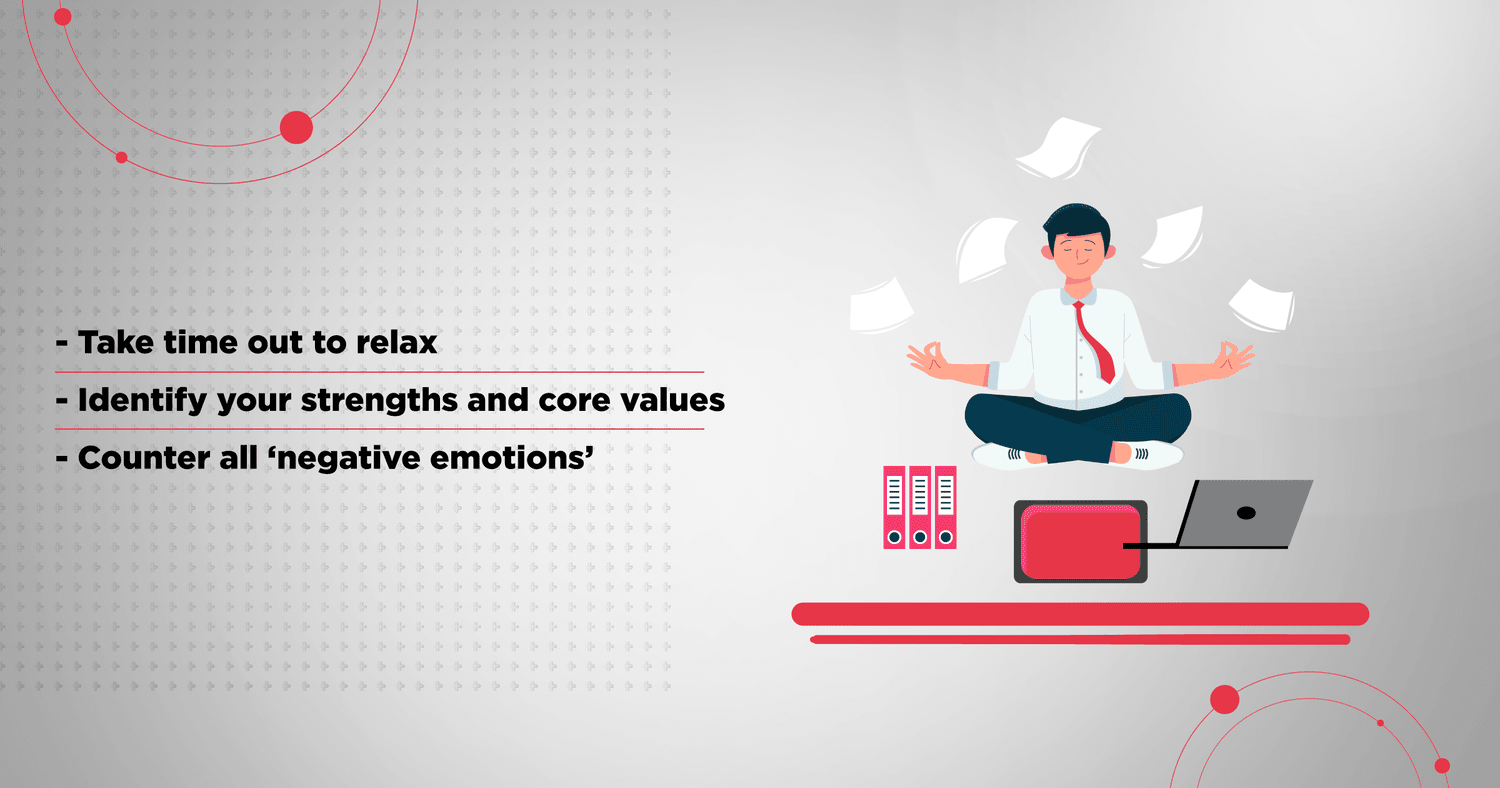
Managing larger-than normal workloads once in a while is absolutely fine (and often, required). However, if long working hours and huge workloads become a regular practice – that will inevitably sap your energy levels, leaving you tired, disengaged, and heavily stressed. To manage this, make sure that your regular work-routine is not one that might have an adverse impact on your physical or mental or emotional or spiritual energy. Take time out to relax, identify your strengths and core values, counter all ‘negative emotions’ (e.g., anxiety, irritability or anger), and enjoy some light conversation with colleagues. Your stress levels will diminish, and you will be able to concentrate better too.
Stress Has Its Triggers; Identify, Tackle & Eliminate Them
Human beings are not robots. As such, no two individuals react the same way to similar external stimuli. What might trigger your stress hormones might seem inconsequential to the person sitting at the opposite desk. It is important to identify these ‘stress triggers’ (say, job uncertainties, unpleasant coworkers, a problem at home, etc.) – and find out how these can be minimised / eliminated. To get a clear pattern on your triggers, try to note down your responses (mental / physical) to certain events for a few days. Just like any good doctor, treat the CAUSES of stress…focusing only on the SYMPTOMS won’t work.
Maintaining A Work-Life Balance Matters; As Does A Good Time-Management Strategy
In the modern-day world, work life is hectic. Even so, it is crucial to not lose sight of the need to maintain a proper work-life balance. Make sure that your personal life does not suffer due to professional responsibilities (or vice versa). In this context, the value of smart time-management also warrants a special mention. Try to avoid procrastination as much as possible, and manage your tasks by utilising the available time optimally. If something calls for deep concentration, ensure that there are no distractions around you. That extra half-hour’s chit-chat with colleagues can wait!
Emotional Intelligence Is Negatively Proportional To Workplace Stress
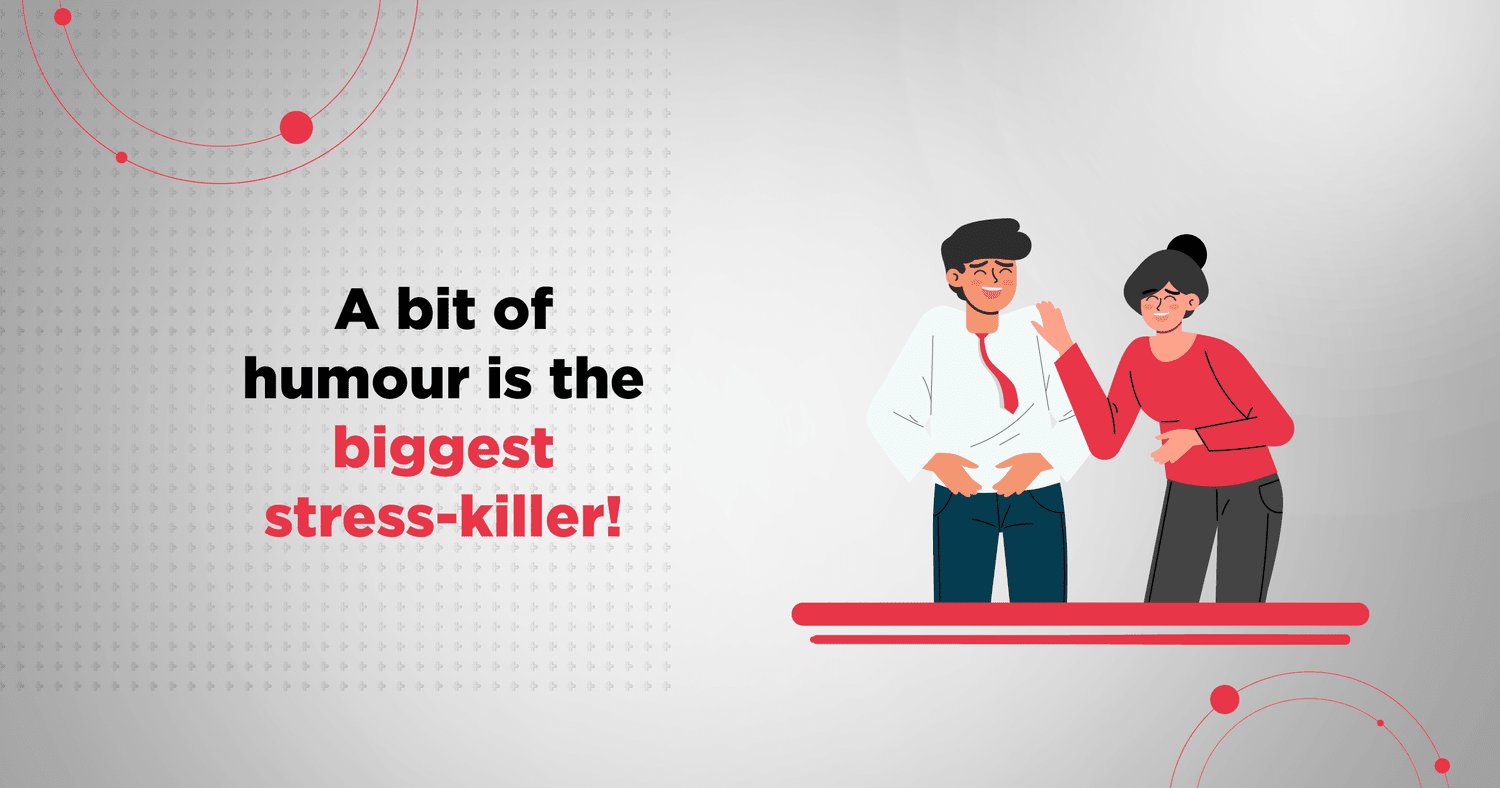
Self-management, self-awareness, maintenance of healthy work relationships and social awareness – these are the foundations of your ‘emotional intelligence’. A proper balance of this ‘emotional intelligence’ and ‘intellectual abilities’ can be instrumental for bringing down stress levels. Through regular communication with others and having a pleasant demeanour (even in the face of apparent adversities), you can make yourself more approachable, and resolve conflicts (if any) in an amicable manner. Pay attention to your stress symptoms, learn about non-verbal cues, and practise the art of responding to challenges with a smile. A bit of humour is the biggest stress-killer!
Prioritise; Be Organised; Stay Well Away From Toxic People and Conversations
All work is urgent. However, the more you try to multitask, the more overburdened you will feel. At the start of every day (or every week, for that matter) take stock of all your assignments, prioritise them in terms of importance, and complete them accordingly. If required, work with your colleagues and / or supervisors for this. Being organised is a surefire way of working efficiently, and avoiding that ‘overwhelmed’ feel.
Also, it is absolutely okay to have the occasional differences of opinion at work. However, avoid more-than-necessary interactions with people or conversations that you find toxic or stress-inducing. If you have a problem with someone, talk it out with him / her – instead of participating in the gossip mill, and making a big deal out of it. Remember, peaceful work ambiance = minimal stress.
Follow The 4As Of Stress Management
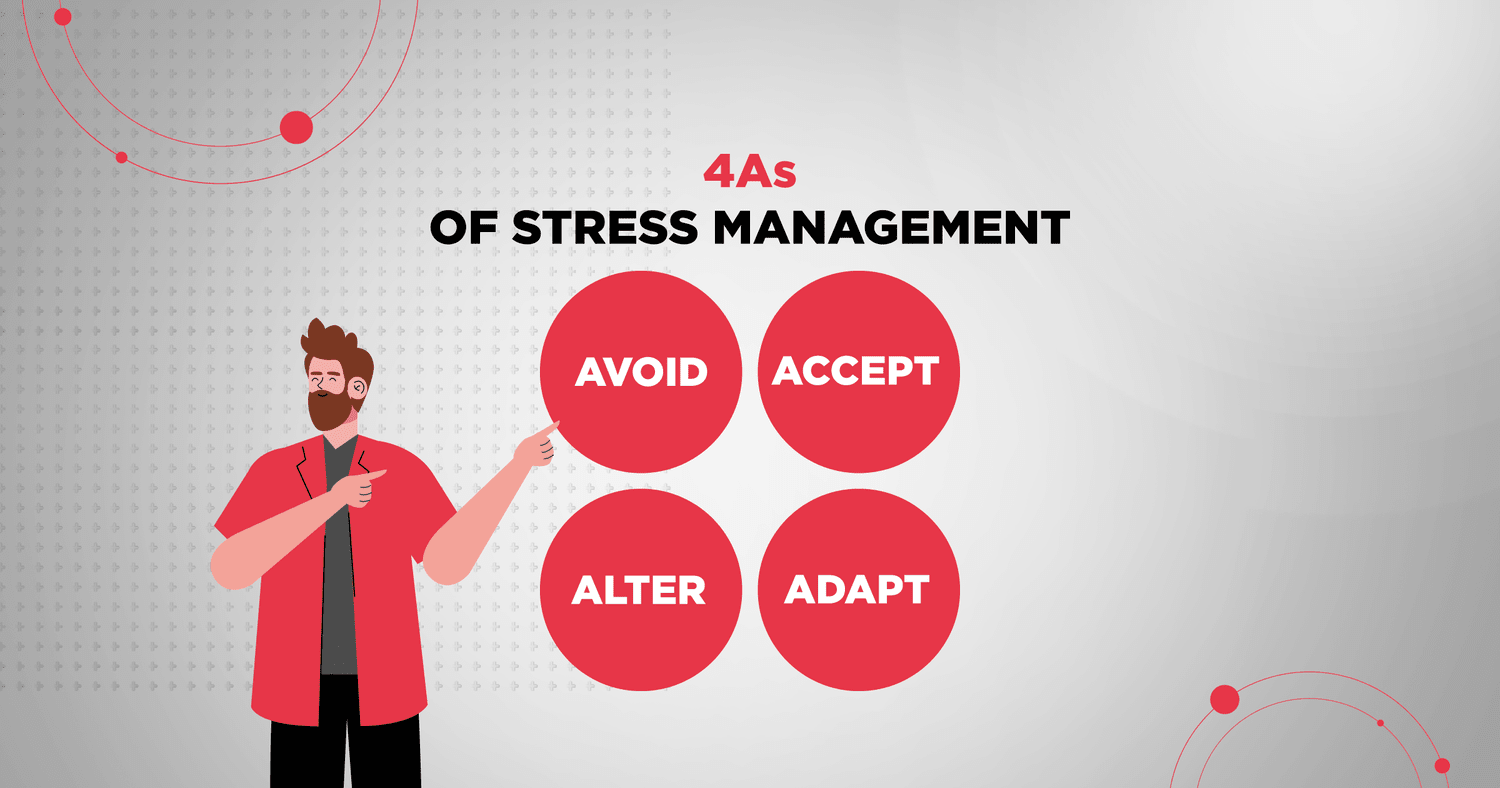
In spite of your best efforts, life cannot be absolutely stress-free. Problems start cropping up when the stress levels go beyond your coping ability. To avoid such scenarios, following the 4As of stress management is important:
- AVOID stress triggers by planning well, controlling your environment, and learning to say ‘no’ when it’s essential.
- ACCEPT the situation when there’s no other alternative. In such cases, you can manage stress by positive self-reinforcements, learning from past mistakes, and having a strong support group (friends, family) around you.
- ALTER the situation when possible, by expressing your feelings, managing your time better, and even requesting ‘problem people’ to change their way of communication. Be respectful at all times.
- ADAPT to every challenge and ‘apparent stress trigger’, by transforming it into an opportunity, having the bigger picture in mind, and eliminating negative thoughts. If needed, reframe your own working style and routines to stay in control.
Frame Effective Responses; Have Some Go-To Relaxation Techniques
At times, it’s not the stress per se, but a belief that ‘I can’t cope with this’ – that creates the real damage. To counter this, develop healthy responses to stressful situations. To unwind and relax, pursue a hobby, spend quality time with people who care, read a book, do some physical activity, and catch up on sleep. Follow a set of relaxation techniques (yoga, meditation, etc.) everyday – to cleanse your mind of excess stress. Gradually, this will enhance your inner calm – lowering your chances of having an unpleasant outburst at work, or ‘stress binge-eating’, or worse.
Be Aware Of The Ill-Effects Of Mounting Stress; Seek Assistance, If Required
Depression. Burnout. Elevated anxiety levels.
These are all very common results of mounting stress levels. Don’t make the mistake of constantly neglecting the pressure you are being subjected to – and the toll it is taking on your physical and / or mental health. If you feel that your stress levels really cannot be managed by yourself, don’t shy away from seeking help from a professional counsellor / therapist. From Oprah Winfrey to Naomi Osaka, and from John Green to Ricky Williams – plenty of celebs have recently opened up about stress & anxiety. This certainly is not a taboo – and seeking help when needed is the smart thing to do.
An overwhelming 9 out of every 10 people opine that workplace stress has significant adverse effects on their quality of work. It is fairly easy to identify the telltale symptoms of surging stress levels – which can range from abnormally long working hours and diminishing productivity, to growing absenteeism, and even a mass exodus of valuable manpower. The onus lies equally on individual employees to manage & minimise stress levels, and on organisations to ensure that their teams are not forced to work under excess (and undue) pressure. When stress-related problems are kept at an arm’s length, the goals of employees and employers remain in sync – and it becomes a win-win situation for everyone concerned.
When workplace stress is not managed well and on time, your personal relationships can also get dented. Be aware of how you can manage & minimise stress – and become a happy chappie, both professionally and in your personal sphere.

Vandana is a Human Resources Manager at Brandwizz. She Heads Talent Management at Brandwizz. Apart from work, she loves reading and listening to music.




